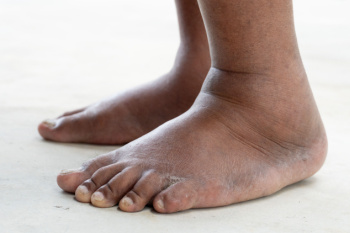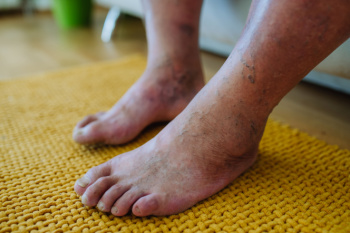
When adults experience heel pain, a podiatrist begins diagnosis by asking detailed questions about symptoms, daily activities, and any recent injuries. The exact location of the pain, whether under the heel, behind it, or on the sides, can help identify the cause. Common conditions include plantar fasciitis, Achilles tendinopathy, or heel spurs. During a physical exam, the podiatrist checks for tenderness, swelling, range of motion, and how the foot functions during movement. Gait analysis may reveal abnormal foot mechanics. Imaging tests such as X-rays or ultrasound are sometimes used to detect bone spurs, soft tissue damage, or stress fractures. In certain cases, lab tests may be ordered to rule out systemic conditions. Because heel pain can have many causes and may worsen without treatment, it is suggested that you see a podiatrist for an accurate diagnosis and an effective treatment plan.
Many people suffer from bouts of heel pain. For more information, contact Ankita Patel, DPM of All Pro Foot and Ankle. Our doctor can provide the care you need to keep you pain-free and on your feet.
Causes of Heel Pain
Heel pain is often associated with plantar fasciitis. The plantar fascia is a band of tissues that extends along the bottom of the foot. A rip or tear in this ligament can cause inflammation of the tissue.
Achilles tendonitis is another cause of heel pain. Inflammation of the Achilles tendon will cause pain from fractures and muscle tearing. Lack of flexibility is also another symptom.
Heel spurs are another cause of pain. When the tissues of the plantar fascia undergo a great deal of stress, it can lead to ligament separation from the heel bone, causing heel spurs.
Why Might Heel Pain Occur?
- Wearing ill-fitting shoes
- Wearing non-supportive shoes
- Weight change
- Excessive running
Treatments
Heel pain should be treated as soon as possible for immediate results. Keeping your feet in a stress-free environment will help. If you suffer from Achilles tendonitis or plantar fasciitis, applying ice will reduce the swelling. Stretching before an exercise like running will help the muscles. Using all these tips will help make heel pain a condition of the past.
If you have any questions please contact our office located in Swedesboro, NJ . We offer the newest diagnostic and treatment technologies for all your foot and ankle needs.

Swollen feet can be a sign of various underlying medical conditions that affect the body’s ability to manage fluid balance. During pregnancy, hormonal changes and increased pressure on blood vessels can cause fluid retention, leading to noticeable swelling in the feet and ankles. Heart conditions such as congestive heart failure may impair circulation, allowing fluid to accumulate in the lower extremities. When kidney function is reduced, the body may struggle to eliminate excess fluid and sodium, contributing to swelling. Liver disease can also lead to fluid buildup due to decreased production of proteins that regulate blood volume. Additionally, poor circulation, often from conditions like venous insufficiency, can prevent blood from flowing effectively back to the heart. If you have swollen feet, it is suggested that you visit a podiatrist who can offer you effective relief and management methods.
Swollen feet can be a sign of an underlying condition. If you have any concerns, contact Ankita Patel, DPM of All Pro Foot and Ankle. Our doctor can provide the care you need to keep you pain-free and on your feet.
Swollen feet are a common ailment among pregnant women and people who stand or sit for extended periods. Aging may increase the possibility of swollen feet and patients who are obese often notice when their feet are swelling too. There may be medical reasons why swollen feet occur:
- Phlebitis - A condition that causes the veins to become inflamed and can also cause leg pain.
- Liver disease - This may lead to low blood levels of albumin which is a protein. This can cause fluid in the blood to pass into the tissues and several areas of the body can become swollen.
- Heart failure - When the heart doesn’t pump properly the blood that is normally pumped back to the heart can pool in the veins of the legs causing swollen feet.
- Kidney disease - One of the main functions of the kidneys is releasing excess fluid in the body. This type of condition can make it difficult for the kidneys to function properly, and as a result the feet may become swollen.
- Deep-vein thrombosis (DVT)- This is a serious condition where blood clots form in the veins of the legs. They can block the return of blood from the legs to the heart which may cause the feet to swell. It is important to be treated by a podiatrist if this condition is present.
Swollen feet can also be caused by bone and tendon conditions, including fractures, arthritis, and tendinitis. Additionally, there may be skin and toenail conditions and an infection may cause the feet to swell. Patients who take medicine to treat high blood pressure may be prone to getting swollen feet.
Many patients elevate their feet to help relieve the swelling and this is generally a temporary remedy. When a podiatrist is consulted the reason behind the swelling can be uncovered and subsequently treated.
If you have any questions please feel free to contact our office located in Swedesboro, NJ . We offer the newest diagnostic tools and technology to treat your foot and ankle needs.

Ankle pain after running is a common complaint, but it is often preventable with the right approach. Warming up before a run and stretching afterward can improve flexibility and reduce strain on the ankles. Strengthening the muscles surrounding the ankle through targeted exercises also helps provide better support during runs. Wearing proper running shoes with good arch support and cushioning is essential. Replace worn-out shoes regularly to avoid uneven pressure on your feet and ankles. Running on even surfaces can also reduce the risk of rolling or straining the ankle. Gradually increasing your distance and intensity gives your body time to adjust without overloading your joints. If you experience persistent ankle pain after running, it is important to consult a podiatrist, who can identify underlying issues and recommend treatment options or custom orthotics to help keep you running comfortably.
Ankle pain can have many different causes and the pain may potentially be serious. If you have ankle pain, consult with Ankita Patel, DPM from All Pro Foot and Ankle. Our doctor will assess your condition and provide you with quality foot and ankle treatment.
Ankle pain is any condition that causes pain in the ankle. Due to the fact that the ankle consists of tendons, muscles, bones, and ligaments, ankle pain can come from a number of different conditions.
Causes
The most common causes of ankle pain include:
- Types of arthritis (rheumatoid, osteoarthritis, and gout)
- Ankle sprains
- Broken ankles
- Achilles tendinitis
- Achilles tendon rupture
- Stress fractures
- Tarsal tunnel syndrome
- Plantar fasciitis
Symptoms
Symptoms of ankle injury vary based upon the condition. Pain may include general pain and discomfort, swelling, aching, redness, bruising, burning or stabbing sensations, and/or loss of sensation.
Diagnosis
Due to the wide variety of potential causes of ankle pain, podiatrists will utilize a number of different methods to properly diagnose ankle pain. This can include asking for personal and family medical histories and of any recent injuries. Further diagnosis may include sensation tests, a physical examination, and potentially x-rays or other imaging tests.
Treatment
Just as the range of causes varies widely, so do treatments. Some more common treatments are rest, ice packs, keeping pressure off the foot, orthotics and braces, medication for inflammation and pain, and surgery.
If you have any questions, please feel free to contact our office located in Swedesboro, NJ . We offer the newest diagnostic and treatment technologies for all your foot care needs.

If you have diabetes, taking care of your feet is essential. High blood sugar can damage nerves, causing numbness and reducing blood flow, making it harder for even small cuts or blisters to heal. This increases the risk of serious complications, including infections and ulcers, which can lead to limb loss, if not properly managed. Daily foot care is one of the best ways to prevent problems. Inspect your feet each day for cuts, redness, swelling, or signs of infection. Keep your feet clean, moisturized, and always wear shoes to protect against injury. Regular trimming of toenails, properly fitting footwear, and managing your blood sugar are also key to keeping your feet healthy. Even without symptoms, people with diabetes benefit from regular foot exams. If you are part of this population, it is suggested that you schedule an appointment with a podiatrist for a comprehensive foot evaluation and personalized care plan to help prevent complications.
Diabetic foot care is important in preventing foot ailments such as ulcers. If you are suffering from diabetes or have any other concerns about your feet, contact Ankita Patel, DPM from All Pro Foot and Ankle. Our doctor can provide the care you need to keep you pain-free and on your feet.
Diabetic Foot Care
Diabetes affects millions of people every year. The condition can damage blood vessels in many parts of the body, especially the feet. Because of this, taking care of your feet is essential if you have diabetes, and having a podiatrist help monitor your foot health is highly recommended.
The Importance of Caring for Your Feet
- Routinely inspect your feet for bruises or sores.
- Wear socks that fit your feet comfortably.
- Wear comfortable shoes that provide adequate support.
Patients with diabetes should have their doctor monitor their blood levels, as blood sugar levels play such a huge role in diabetic care. Monitoring these levels on a regular basis is highly advised.
It is always best to inform your healthcare professional of any concerns you may have regarding your feet, especially for diabetic patients. Early treatment and routine foot examinations are keys to maintaining proper health, especially because severe complications can arise if proper treatment is not applied.
If you have any questions please feel free to contact our office located in Swedesboro, NJ . We offer the newest diagnostic and treatment technologies for all your foot and ankle needs.
